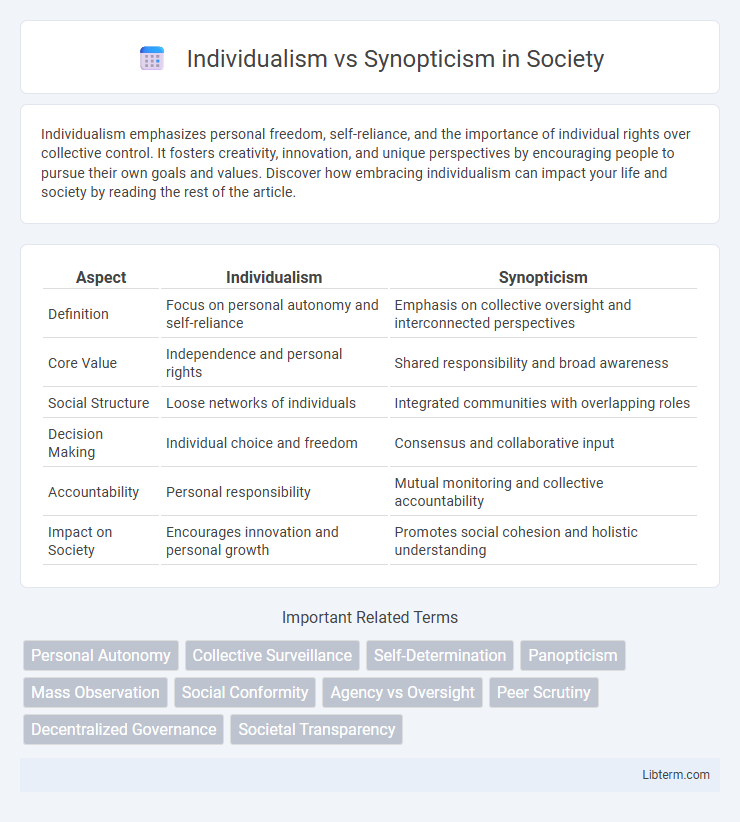Individualism emphasizes personal freedom, self-reliance, and the importance of individual rights over collective control. It fosters creativity, innovation, and unique perspectives by encouraging people to pursue their own goals and values. Discover how embracing individualism can impact your life and society by reading the rest of the article.
Table of Comparison
| Aspect | Individualism | Synopticism |
|---|---|---|
| Definition | Focus on personal autonomy and self-reliance | Emphasis on collective oversight and interconnected perspectives |
| Core Value | Independence and personal rights | Shared responsibility and broad awareness |
| Social Structure | Loose networks of individuals | Integrated communities with overlapping roles |
| Decision Making | Individual choice and freedom | Consensus and collaborative input |
| Accountability | Personal responsibility | Mutual monitoring and collective accountability |
| Impact on Society | Encourages innovation and personal growth | Promotes social cohesion and holistic understanding |
Defining Individualism: Core Principles and Values
Individualism emphasizes the autonomy and intrinsic worth of the individual, advocating personal freedom, self-reliance, and individual rights as fundamental values. It prioritizes personal identity and independent decision-making over collective norms or societal expectations. Core principles of individualism include equality before the law, freedom of expression, and the pursuit of personal goals without undue interference from external authorities.
Understanding Synopticism: Origins and Key Concepts
Synopticism originated from the desire to synthesize diverse perspectives into a unified framework, emphasizing collective understanding over isolated viewpoints. Key concepts include holistic analysis, systemic interconnectedness, and the integration of multiple narratives to reveal broader patterns. This approach contrasts with individualism by prioritizing group coherence and shared meanings within complex social or cultural systems.
Historical Perspectives: Individualism vs Synopticism
Historical perspectives on individualism emphasize the autonomy and self-reliance of individuals as central to social and political development, tracing roots back to Enlightenment thinkers like John Locke and Jean-Jacques Rousseau. Synopticism, in contrast, prioritizes a holistic and integrative view, often associated with philosophical traditions such as German Idealism and systems theory, emphasizing interconnectedness and collective understanding. The tension between individualism and synopticism reflects broader debates in philosophy and social sciences about the balance between personal agency and systemic cohesion throughout history.
Philosophical Foundations: Contrasting Worldviews
Individualism emphasizes personal autonomy, self-reliance, and the intrinsic value of the individual, rooted in Enlightenment philosophy and liberalism. Synopticism advocates for a holistic worldview, prioritizing collective understanding and interconnectedness, drawing from systems theory and holistic epistemology. These contrasting foundations reflect divergent approaches to knowledge, ethics, and social organization, shaping perspectives on freedom, responsibility, and truth.
Cultural Impact: Society Under Individualism and Synopticism
Individualism fosters personal autonomy, encouraging innovation and self-expression, which shapes diverse cultural landscapes and promotes social mobility. Synopticism emphasizes collective perspectives, enhancing social cohesion and shared values through communal narratives and collaborative decision-making. The cultural impact of these philosophies is evident in societal structures: individualism drives dynamic pluralism, while synopticism strengthens unified identity and cooperative norms.
Individual Rights vs Collective Vision: The Ongoing Debate
The ongoing debate between Individualism and Synopticism centers on balancing individual rights with the collective vision of society. Individualism emphasizes personal freedoms, autonomy, and self-expression, while Synopticism advocates for communal goals, social cohesion, and shared responsibilities. Resolving this tension is crucial for policies that respect personal liberties without undermining the common good and collective welfare.
Influence on Modern Politics and Governance
Individualism emphasizes personal autonomy and the protection of individual rights, shaping liberal democracies that prioritize freedom, private property, and limited government intervention. Synopticism, with its focus on collective oversight and integrated perspectives, influences governance models that value transparency, accountability, and collaborative decision-making. Modern political systems often balance these approaches by promoting both personal liberties and collective responsibilities to address complex societal challenges effectively.
Education and Personal Development: Divergent Approaches
Individualism in education emphasizes personalized learning paths, fostering self-directed study and critical thinking skills tailored to unique student interests and strengths. Synopticism advocates for a holistic curriculum integrating interdisciplinary knowledge, promoting collective understanding and collaborative problem-solving abilities. These divergent approaches shape personal development by either prioritizing autonomous growth or collective synthesis of diverse perspectives.
Economic Implications: Markets, Innovation, and Community
Individualism drives market competition by promoting entrepreneurial risk-taking and innovation, leading to diverse product offerings and dynamic economic growth. Synopticism emphasizes collaborative decision-making and shared community values, fostering cooperative economic models that prioritize sustainability and social welfare over mere profit maximization. Balancing these approaches influences market efficiency, innovation rates, and the strength of community economic resilience in rapidly changing global economies.
Reconciling Individualism and Synopticism: Pathways Forward
Reconciling individualism and synopticism involves creating frameworks that honor personal autonomy while integrating collective insights for holistic understanding. Emphasizing dialogue between singular perspectives and systemic views fosters cooperation without diminishing unique identities. Pathways forward include developing interdisciplinary methodologies and participatory platforms that balance individual expression with shared knowledge synthesis.
Individualism Infographic

 libterm.com
libterm.com